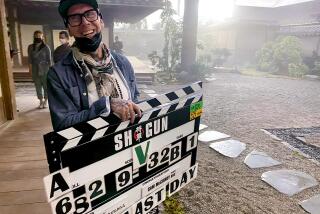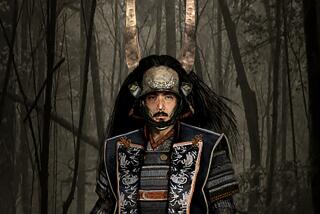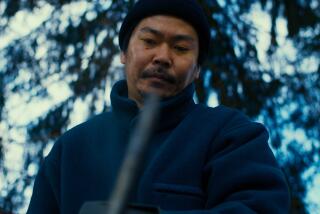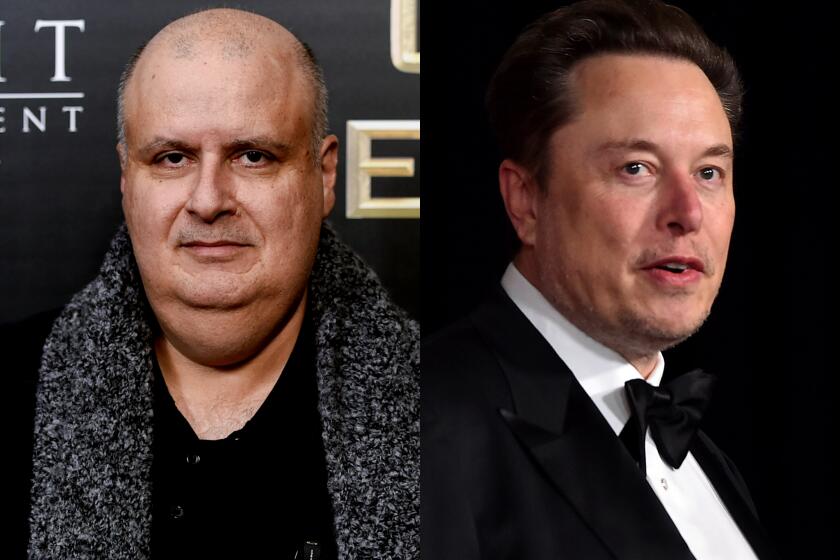MOVIE REVIEW : ‘Emperor’ Traces a Soldier’s Obsession
The arrival of Kazuo Hara’s “The Emperor’s Naked Army Marches On” (at the Nuart through Friday) in the wake of Hirohito’s funeral couldn’t have been better timed.
The death of Japan’s longtime emperor has called attention to the enduring uncertainty over his role in World War II, but the figure who is the subject of this profoundly unsettling, irresistibly compelling documentary has never had any qualms in calling for Hirohito to accept responsibility for the death of his soldiers and the suffering of his people.
Kenzo Okuzaki, proprietor of a Kobe car battery shop, sees it as Hirohito’s moral duty, as Supreme Commander of the Japanese Army, to do this. One of the few survivors of Japan’s 36th Engineering Corps who faced malaria and starvation in East New Guinea, Okuzaki in 1969 fired four pachinko balls at the emperor with his handmade slingshot, reportedly crying out the names of his fellow soldiers killed in action. A prison term only intensified Okuzaki’s convictions.
In short, Okuzaki was clearly a man obsessed when he crossed paths with Hara, an associate of director Shohei Imamura, who is credited with conceiving this film and who has always been fascinated by obsessive behavior. After seeing this film twice--it was shown last year at AFI Film Fest--it is impossible not to believe that Hara has served as a catalyst for pushing an increasingly disturbed individual over the edge. You come away believing that Okuzaki is absolutely correct in his attitude toward the emperor, but that decades of frustration in pursuing his cause have turned him into an increasingly dangerous fanatic--something that he is not only aware of but revels in. “The Emperor’s Naked Army Marches On” is a highly irresponsible film, which, paradoxically, probes the nature of responsibility.
Shot over a five-year period, the film turns out not to be about Okuzaki hectoring the emperor--although he does this from time to time, shouting over a loudspeaker in his slogan-covered car--but rather his investigation of the murders of two soldiers in East New Guinea apparently on orders of their own officers, killings that took place 23 days after the armistice. Okuzaki looks up a series of aging veterans, badgering and even battering them physically, until he at last learns the terrible truth about why the killings occurred. Okuzaki’s findings are persuasive, but what he tries to do as a result of his discoveries is deplorable.
It’s hard to believe that Okuzaki, who was convicted of murder in the 1950s, would have embarked on this odyssey without Hara’s encouragement. (Why are we not told who Okuzaki killed more than 30 years ago and why he did it?) There’s an undeniable dark humor in the repeated spectacle of Japanese, middle-aged and older, struggling to maintain traditional decorum in the face of Okuzaki’s relentless and deliberate outrageous behavior in the pursuit of truth.
“The Emperor’s Naked Army Marches On” (Times-rated Mature) is like a Leni Riefenstahl documentary in that you can never truly resolve your contradictory feelings toward it. Undeniably, what Okuzaki uncovered was worth uncovering, and almost certainly nobody else would have bothered. At the same time, you cannot dismiss the feeling that a film maker has exploited a dangerous individual who in fact attempted another killing--of a man he knew to be innocent.
More to Read
Only good movies
Get the Indie Focus newsletter, Mark Olsen's weekly guide to the world of cinema.
You may occasionally receive promotional content from the Los Angeles Times.










